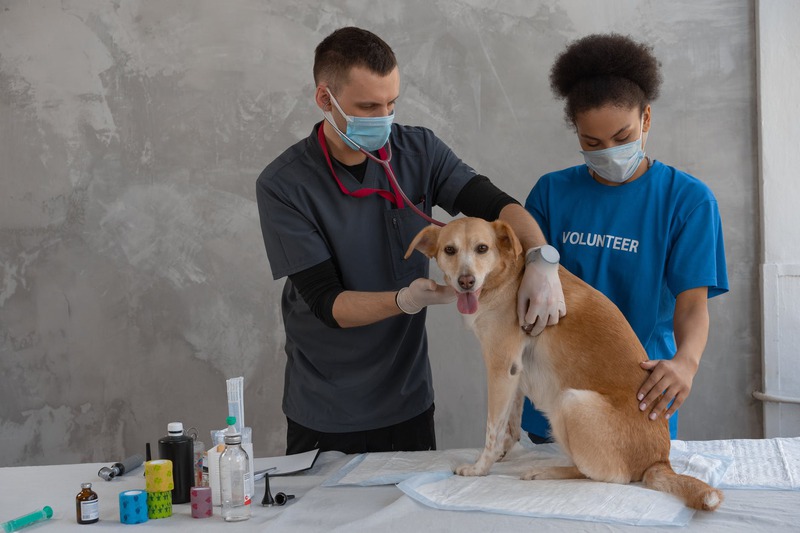We all love our pets and would do anything to ensure they’re in the best health. A major aspect of pet health often overlooked is testing for and preventing internal parasites. These parasites are more than nuisances; they can cause serious health problems if not treated.
The Kinds of Internal Parasites Your Pet Might Encounter
Your pets can encounter a host of parasites, from common to rare. Several parasites that typically infest pets include hookworms, roundworms, and tapeworms. Although some parasites like heartworms are more common in certain geographical areas, your pets are at some risk, irrespective of where you stay.
How Animals Contract Internal Parasites
Pets can contract parasites in various ways that often depend on the type of parasite and the pet’s lifestyle. Here are five of the most common ways your pet can contract these unwanted guests:
- Via the Environment: Parasites often lurk in the soil, water, and air. An outdoor pet is at risk of contracting parasites simply by being exposed to contaminated elements of the environment.
- Through Contaminated Food and Water: Parasite eggs or larvae can be present in contaminated food and water. If your pet ingests these, the parasites can hatch in your pet’s digestive system and start to multiply.
- Contact with Other Infected Animals: If your pet interacts with another infested animal, either through social activities or fights, there is a potential they may contract parasites as many are transferrable from host to host.
- Parasites Living on the Pet’s Body: Fleas or ticks on your pet’s body aren’t irritating; they can also spread internal parasites like tapeworms.
- Via Mothers to their Offsprings: In some cases, especially with worms like roundworms, a mother’s unborn or young offspring can be infected through her milk.
Understanding the Effects of Internal Parasites on Your Pet’s Health
Internal parasites can cause various health issues in your pets, ranging from weight loss and diarrhea to more serious conditions like anemia. Some parasites may even lead to chronic diseases affecting the heart, liver, and other organs.
Pet Vaccinations & Parasite Prevention
A fundamental aspect of pet health and parasite prevention involves vaccines. Vaccinations, including core puppy shots, are paramount to protecting your pet against certain diseases carried by parasites. Regular deworming is also a crucial element of a comprehensive parasite prevention plan.
Prevention Strategies for Internal Parasites
Preventing parasite infestation involves a combination of regular veterinary check-ups and maintaining a clean environment for your pet. Regular grooming, providing clean water and food, and preventing your pet from scavenging can all minimize the risk of parasite infection.
Cat & Dog Routine Exams
Routine wellness exams for pets are a great way to catch parasite infestation early. These examinations typically involve a thorough physical inspection and may include stool sample testing to check for the presence of internal parasites.
How Often Should You Test Your Pet for Internal Parasites
Pets should be typically tested for internal parasites at least once every year. However, kittens, puppies, and pets with known health issues may require testing more frequently.
Understanding and Interpreting Parasite Test Results
Interpreting parasite test results can often feel intimidating for pet owners. Below, we’ll guide you through the process and what potential results imply:
- Positive Results: A positive test result implies your pet has an internal parasite infection. The veterinarian will inform you about the specific type of parasite, the severity of the infection, and the recommended treatment options. It’s essential not to panic; most parasitic infections are treatable with medication.
- Negative Results: A negative result may indicate your pet has no infection. However, it doesn’t 100% guarantee that your pet is free from all parasites, as some may not show up in every test due to their lifecycle stages or less sensitive testing methods.
- False Positive/Negative Results: While uncommon, false positives or negatives can occur for various reasons, such as an error in the sample processing or due to stages of the parasite’s lifecycle.
- Re-testing: Depending on the type of parasite suspected, your vet may recommend re-testing after a certain period, particularly if the initial test results were negative, but the pet continues to show symptoms of a potential infection.
- Follow-up Testing: If your pet tests positive and undergoes treatment, the vet will likely recommend follow-up tests to ensure the treatment has fully eradicated the parasite.
Dealing with Internal Parasite Infections
Treatment for parasites may include oral medication, injections, or, in severe cases, surgery.
Veterinary Surgery
For more severe infections, pet surgical services in Somerset, KY, and similar services elsewhere are often able to efficiently remove parasites and repair any damage they may have caused. Typically a last resort, surgery can be a lifesaving procedure for pets heavily infested with parasites.
Special Considerations: Puppies, Kittens, And Pets With Health Conditions
These pets often require more frequent testing and treatments as their immune systems are less robust than adults or healthy pets. They also may necessitate more specialized aftercare.
Conclusion
Prevention is always better than cure, especially when it comes to parasites. Regular vet visits, vaccination, and good hygiene practices can help ensure your pet stays parasite-free and lives a long, happy life.





